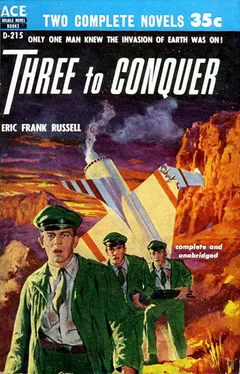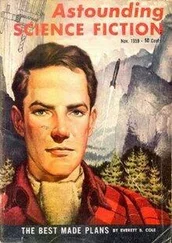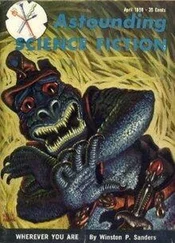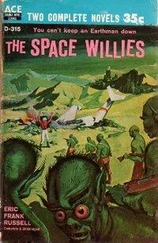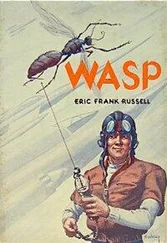“Easily enough. I took aim, fired, and down she slid.”
“I’m not asking about that.” The finger tapped impatiently. “I am referring to this.”
“Oh, the eavesdropping.” Harper pretended to gain an understanding that he had not lost in the first place. “I did it in the same way the enemy might be able to do it, whenever he wants to know what we’re up to.”
“You may go,” Jameson said to Pritchard. “I’ll call you when I want you.” He waited until the door had closed, then fixed his full attention on Harper. “Are you categorically asserting that agents of other powers are able to read our minds at-will?”
“No.”
“Then, why make such a suggestion?”
“I’m merely proposing that what one can do, another can do,” said Harper. “It’s a notion I’ve nursed for years. So far, I’ve been unable to find any evidence in support.”
“Obviously you are talking about something you can do. What can you do?”
“That,” said Harper, pointing to the paper.
Jameson was no fool. He had grasped the idea at the start, but still found considerable difficulty in absorbing it. The manifest explanation was proving indigestible.
“It would take a telepath to play these sort of tricks.”
“Nothing else but,” agreed Harper.
“Who ever heard of one?”
Harper merely shrugged.
Switching on his little intercom-board, Jameson spoke into its mike. “Is Miss Keyes there? Put her on. Miss Keyes, I want you to type a column of twenty eight-digit numbers, chosen at random. Bring it to me immediately you have finished.” He switched off, gave Harper a challenging look, poked the paper toward him and said, “See what you can do with that.”
“Now I’ve got to search through the general mess for somebody concocting meaningless numbers,” Harper complained. “I may miss the first one or two while I’m feeling around.”
“Never mind; do the best you can. If you get only a quarter of them, it will convince me that the age of miracles has not passed.”
Harper wrote down eighteen of them, plus the last two digits of the nineteenth. Taking the paper without comment, Jameson waited for Miss Keyes. She arrived shortly, gave him her list and departed with no visible surprise. Jameson compared the two columns.
Finally he said, “This is worse than a bomb in the Pentagon. Nothing is private property any more.”
“I know.”
“How did it happen?”
“Can a man with a harelip tell you how it happened? All I know is that I was born that way. For a few years, I assumed that everyone else was precisely like myself. Being a child, it took quite a time to learn that it was not so; to learn that I was a one-eyed man in the kingdom of the blind; to learn that I could be feared, and that the feared are hated.”
“There must be a reason for it,” said Jameson. “Does it matter?”
“It matters a hell of a lot. You are a freak created by some very special arrangement of circumstances. If we could detail those circumstances fully and completely, we could estimate the likelihood of them being duplicated elsewhere. That, in turn, would give us a fair idea of whether there are any more like you—and, if so, who’s got them.”
Harper said quietly and soberly, “I don’t think that matters a damn—not any more.”
“Why doesn’t it?”
“Because I made mental contact with Jocelyn Whittingham, and she promptly called me an insulting name. So I shot her.”
“You considered that adequate motive for murder?” prompted Jameson.
“In view of the name, yes!”
“What did she call you?”
“A Terrestrial bastard.”
For a full two minutes Jameson sat there like one paralyzed. His thoughts milled mildly around, and he was momentarily oblivious of the fact that Harper could read them as easily as if they were in neon lights.
Then he asked, “Are you sure of that?”
“The only person in the world who can be positive about someone else’s mind is a telepath,” assured Harper. “I’ll tell you something else: I shot her because I knew I couldn’t kill her. It was a physical impossibility.”
“How d’you make .that out?”
“No living man could harm Jocelyn Whittingham—because she was already dead.”
“Now see here, we have a detailed police report—”
“I killed something else,” said Harper. “I killed the thing that had already slaughtered her.”
Jameson promptly went into another whirl. He had a cool, incisive mind used to dealing with highly complicated problems, but essentially normal ones. This was the first time within his considerable experience that he had been slapped in the face by a sample of the supernormal.
One thing surprised the observing Harper—namely, that much of the other’s confusion stemmed from the fact that he lacked certain information he could reasonably be expected to possess. High up in the bureaucratic hierarchy Jameson might be; but evidently he was not high enough. All the same, he had enough pull to take the matter further and get some action.
Harper said, “You’ve got the bald account from police sources. It isn’t enough. I’d like to give you my side of the story.”
“Go ahead,” invited Jameson, glad to concentrate on something that might clear up the muddle.
Commencing with his pick-up of the dying Alderson’s broadcast, Harper took it through to the end.
Then he said, “No ordinary human being is ever aware of his mind being read. He gains no sense of physical contact that might serve to warn him; he remains completely unconscious of being pried into. I have been absorbing your thoughts the entire time we’ve been here together; your senses have not registered the probe in any way whatever, have they?”
“No,” Jameson admitted.
“And if I had not told you that I’m a telepath, and satisfied you as to the truth of it, you’d have found no cause to suspect that your mind is wide open to me, would you?”
“No.”
“Well,” went on Harper reminiscently, “the instant I touched the mind inside Jocelyn Whittingham, it felt the contact; that mind knew whence it came, took wild alarm, and hated me with a most appalling ferocity. In the same instant I detected all its reactions and recognized it as non-human. The contact did not last a fiftieth of a second, but it was enough. I knew it as nothing born of woman, as surely as your own eyes can tell you that a rattlesnake is not a mewling babe.”
“If it wasn’t human,” inquired Jameson, with much skepticism, “what was it?”
“That I don’t know.”
“Of what shape or form?”
“The shape and form of the Whittingham girl. It had to be that; it was using her body.”
Disbelief suddenly swamped Jameson’s brain. “I will concede that you are either a genuine telepath, or the practitioner of some new and superb trick that makes you look like one. But that doesn’t mean I have to swallow this murder story. What your defense boils down to is that you shot a corpse animated by God knows what. No jury on earth will give such an incredible-plea a moment’s consideration.”
“I’ll never face a jury,” Harper told him.
“I think you will—unless you drop dead beforehand. The law must take its course.”
“For the first time in my naughty life I’m above the law,” said Harper, impressively confident. “What’s more, the law itself is going to say so.”
“How do you reach that remarkable conclusion?”
“The law isn’t interested only in the death of Jocelyn Whittingham. It is even more concerned about the slaying of Trooper Alderson, he having been a police officer. And you can’t pin that one on me, because I didn’t do it.”
Читать дальше
